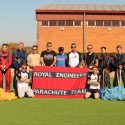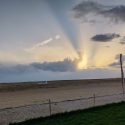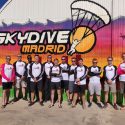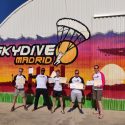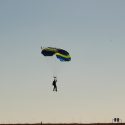Exercise Freefall Fougasse was a 42 Engineer Regiment (Geographical) (42 Engr Regt (Geo)) adventurous training (AT) expedition to Spain. The goal of AT is to be “challenging outdoor training for Service personnel in specified adventurous activities that incorporate controlled exposure to risk, in order to develop: leadership; teamwork; physical fitness; moral and physical courage; as well as other personal attributes and skills that are vital to the delivery of Operational Capability”. Skydiving is thus an excellent activity as it contains so many desired elements of the AT charter.
The aim of the expedition was to qualify 6 students for their British Parachute Association (BPA) ‘A’ licence and progress some experienced skydivers towards new qualifications within the sport. This would be done via the Accelerated Freefall (AFF) course for students and individual coaching and mentoring for the experienced jumpers. It was supported by equipment and instructors from the Royal Engineers Sports Parachute Association (RESPA) and the Royal Logistics Corps (RLC) Silver Stars.
The 13 members came from across the Army, representing the Royal Engineers (RE), the Royal Signals (RS), the RLC, the Royal Electrical and Mechanical Engineers (REME), the Parachute Regiment (Para) and even included an overseas liaison officer from the US Navy. Demonstrating the concept of “One Army” and supporting the goal of Op FORTIFY, three of the members were reservists. This is particularly important as one of the reservists remarked:
“I never thought I had a chance of being accepted due to being a reservist, but I decided that if you don’t apply you’ll never know.”
On the 12 Oct 18, exped members gathered at 42 Engr Regt (Geo) camp and made their way to the Joint Services Parachute Wing (JSPW) at Netheravon in Wiltshire. This is the home of the Army Parachute Association (APA) and where the members were to receive their ground school training. This was delivered by two highly qualified instructors with thousands of jumps between them. It ensured that the members had the best possible training and that all the safety aspects and compliance were taken care of before further deployment.
Having completed ground school, the expedition deployed to the Skydive Madrid drop zone (DZ) South of Madrid. Going overseas to skydive may seem counter intuitive, but the benefits far outweigh the disadvantages as the weather is far more predictable and suitable for training. Ironically the winds were too high for student jumpers on the first day at the DZ, but with classic Army improvisation the exped moved to a wind tunnel facility nearby. This turned out to be invaluable as the students (most of whom had never jumped out of a perfectly serviceable aircraft before) got some insight into the experience of freefall and were able to practice their body positioning.
Over the course of the following 2 weeks the student jumpers steadily progressed through the AFF levels, gaining in confidence and skill with each jump. There was a lot to take on board, but with excellent instruction from the two AFF instructors and plenty of practice it proceeded without issue. The experienced jumpers worked towards new qualifications such as JM1 – (Jump Master: being able to dispatch other skydivers), FS1 (Formation Skydiving: jumping with others in a team to create formations) and packing (certified to pack main canopies).
By the end of the expedition, all the students had achieved their ‘A’ licences and the experienced jumpers their target qualifications. Together they had overcome fear, displayed courage, increased their self-confidence and pushed out the boundary of their “comfort zone”, making them more capable and effective soldiers. They had formed bonds of friendship and comradeship, subtle but important aspects of operating effectively in the armed services. Additionally, new members had been exposed to sports parachuting, ensuring that the sport will continue to thrive in the future and laying the groundwork for future expeditions.

